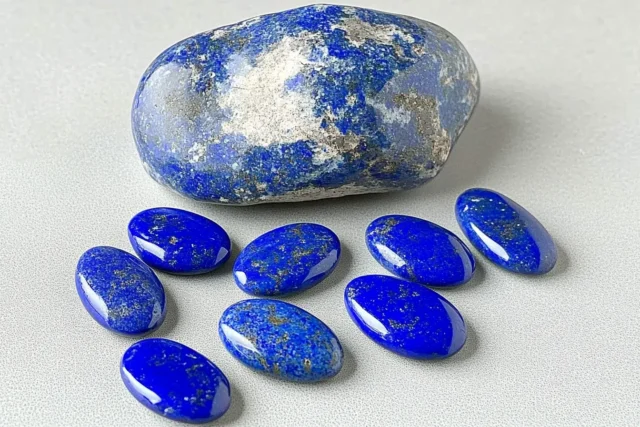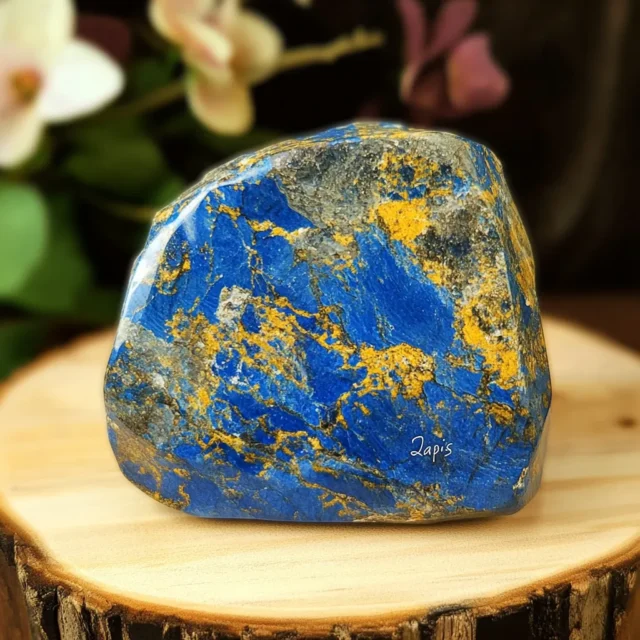

Stone Pronunciation for Lapis Lazuli
Lapis Lazuli Gem is said as “LAP-is LAZ-you-lie,” or “LAP-is LAZ-oo-lee.” In either case, the deep blue hue and spiritual meaning of this ancient gemstone have earned it great appreciation over thousands of years.
Durability and Hardness
On Mohs scale, Lapis Lazuli Stone has a hardness ranging from 5 to 5.5. This makes it rather soft relative to other gemstones, which increases its susceptibility to scratches and calls for careful handling in jewelry and carvings.
Taste and Look
Lapis Lazuli Gem gets a great glow from its waxy to vitreous lustre. Although its surface seems somewhat dull at times, polishing brings out the golden pyrite flecks found within the deep blue stone.
| Type of Lustrousness | Justification |
|---|---|
| Waxy | Appearance that is soft and smooth |
| Vitreous | When polished, glossy, glass-like shine results |
| Dull, or unpolished | Often observed in Raw Lapis Lazuli, less reflective |

Crystal System and Composition
Lapis Lazuli Gem is a multiple mineral rock unlike single-crystal minerals. Lazurite, its main component, is a cubic crystal system and helps to define the structure and vivid color of the stone.
Etymology and Origin
Lapis Lazuli’s name, derived from Latin and Persian sources, captures its meaning. Whereas “Lazuli” comes from the Persian word “lazhuward,” meaning “blue,” “Lapis” means “stone” in Latin. This remarkable deep blue gemstone is aptly named.
Lapis Lazuli’s Location
Mostly mined in Afghanistan, especially in the Sar-e-Sang mines—which have been gemstone producers for more than 6,000 years—authentic Lapis Lazuli is Other important sources are Pakistan, Russia, the United States, and Chile.


Metaphysical Qualities of Lapis Lazuli
Among the most revered stones in history, Lapis Lazuli has metaphysical qualities. Known as the stone of wisdom, truth, and inner power, it is Many see it as embodying mystery and infinite possibility, with the energy of the night sky.
| Physical Quality | Influence |
|---|---|
| Knowledge | Sharpens intellectual capacity |
| Accuracy | Promotes self-expression and truthfulness |
| Inner Power | Increases awareness and confidence |

Lapis Lazuli’s Healing Attributes
Lapis Lazuli has healing properties, including emotional balance and stress release. It’s thought to help the immune system, lower inflammation, and ease migraines. Popular for holistic healing, this stone also helps with respiratory and throat conditions.
| Benefit of Healing | Influence |
|---|---|
| Relief from Stress | Encourages emotional equilibrium |
| Headache Management | Releases eye strain and helps with migraines |
| Support for Immune Systems | Improves blood circulation and detoxification |

Spiritual Properties of Lapis Lazuli
The spiritual properties of lapis lazuli make it a powerful tool for meditation and energy work. It is strongly connected to the throat chakra, enhancing communication and self-expression, and to the third eye chakra, deepening intuition and spiritual insight.
Magical Properties of Lapis Lazuli
The magical properties of lapis lazuli have been revered by ancient and modern mystics alike. It is believed to enhance psychic abilities, dream recall, and spiritual connection. Many practitioners use it in rituals for protection, manifestation, and intuition enhancement.

Raw Lapis Lazuli vs. Tumbled Lapis Lazuli
Both raw lapis lazuli and tumbled lapis lazuli serve different metaphysical purposes. Raw Lapis Lazuli retains its natural energy and is often used in spiritual grids and energy work. Tumbled lapis lazuli, being polished and smooth, is easier to carry or wear as jewelry.
| Type | Appearance | Usage |
|---|---|---|
| Raw Lapis Lazuli | Unpolished, coarse | Energy work, spiritual grids |
| Tumbled Lapis Lazuli | Smooth, polished | Jewelry, meditation stones |

Finding Real Lapis Lazuli
Look for obvious flecks of pyrite, a deep blue color, and natural inclusions to set Authentic Lapis Lazuli apart from replicas. Many fake stones are dyed, thus natural texture and color consistency are absolutely important.
Lapis Lazuli Charm & Cabochon
Popular for rings and pendants, a Lapis Lazuli Cabochon is a very polished gemstone cut without facets that accentuates its rich blue color. Likewise, a Lapis Lazuli Charm is sometimes worn as a protective amulet since it bestows knowledge and insight upon its owner.
Rough Lapis Lazuli: Their Applications
Many times placed in meditation areas or offices, Rough Lapis Lazuli is meant to inspire concentration and clarity. While some people enjoy to keep it in its natural form for decorative and energetic purposes, others wear it in jewelry.

The Blue Colour of Lapis Lazuli and Variations
The most remarkable characteristic of Lapis Lazuli is its blue color. Its strong blue color comes from the lazurite; pyrite inclusions add golden specks. Certain variances, such as Light Blue Lapis Lazuli, have more calcite, which softens their color.
| Type of Color | Look | Valuation |
|---|---|---|
| Deep Blue | Rich pigment, low calcite | Excellent |
| Light Blue Lapis Lazuli | More calcite and softer blue hues | Medium |
| Rich in Pyrite | Big gold specks | Low to High |
Conclusion
Lapis Lazuli is a tool for spiritual development, healing, and self-discovery rather than only a beautiful gemstone. Whether your preferred Lapis Lazuli is Raw Lapis Lazuli, Tumbled Lapis Lazuli, or a Lapis Lazuli Cabochon, this stone has great advantages beyond only looks. From its Metaphysical Properties of Lapis Lazuli to its rich history, it is still among the most prized stones in spiritual enlightenment and therapeutic work.
